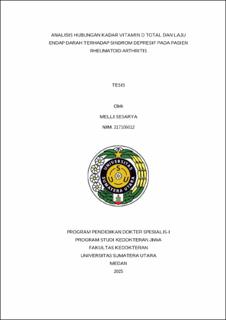| dc.description.abstract | Background: Rheumatoid Arthritis (RA) is a systemic autoimmune disease
characterized by chronic inflammation that can damage joints and extra-articular
organs. RA is characterized by a progressive disease that has detrimental
psychological effects, such as depression. Depression in RA is influenced by the
patient's physical symptoms, such as fatigue, pain, stiffness, and impaired
physical function. RA patients are more susceptible to anxiety, depression, and
cognitive impairment compared to the general healthy population. Many studies
have found a significant correlation between Vitamin D levels and tissue
inflammation scores with depression in RA patients.
Methods: Samples were collected using a non-probability consecutive sampling
method, with a total sample size of 76 RA patients. The Pearson and Spearman
correlation tests were used in this study.
Results: The majority of subjects were female, at 66 (86.8%), with a median age
of 50.5 years. The highest number of subjects were unemployed and had a high
school education, at 54 (71.1%) and 55 (72.4%), respectively. The highest number
of subjects were married, at 64 (84.2%), with 36 (47.4%) having moderate
disease activity. ESR levels and depressive syndrome were positively correlated
with an r value of 0.604, while Vitamin D and depressive syndrome were
negatively correlated with an r value of -0.743.
Conclusion: This study found a relationship between Vitamin D levels and ESR
values and depressive syndrome in RA patients.
Keywords: Depressive syndrome, Vitamin D, Erythrocyte Sedimentation Rate
(ESR), Rheumatoid Arthritis | en_US |


